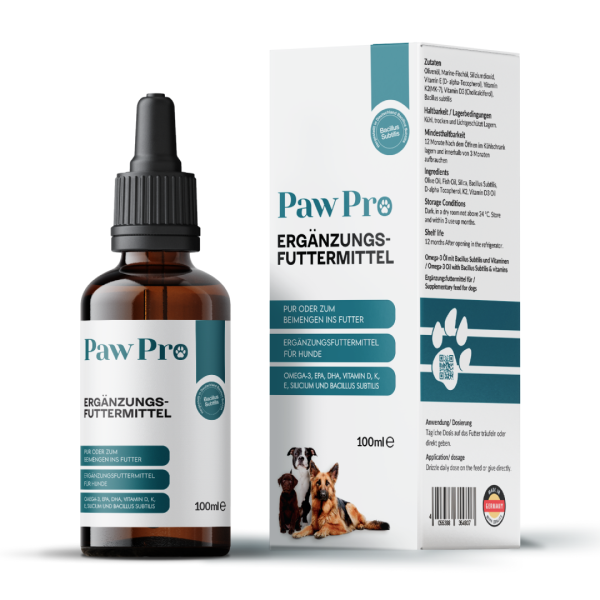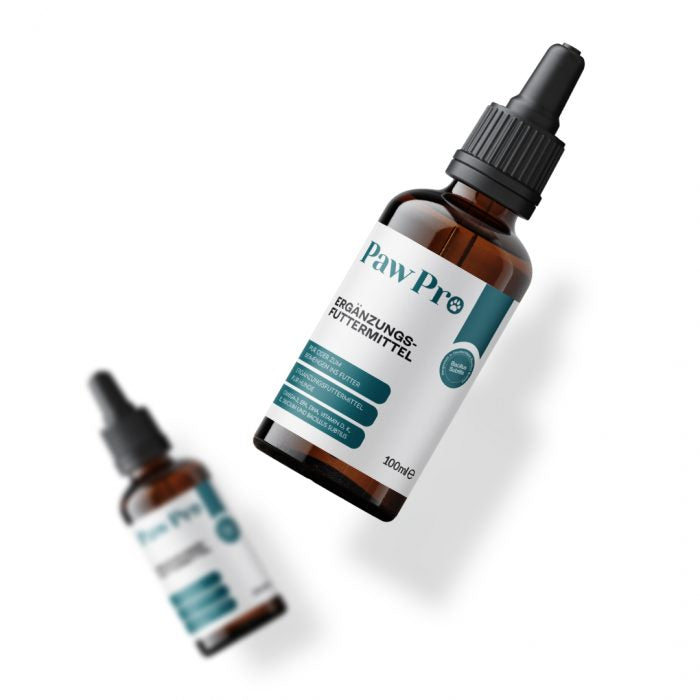Products
Sort by
1 product
FAQ
Frequently Asked Questions
Why probiotics are important for dogs?
Probiotics are live microorganisms that, when consumed in sufficient amounts, provide a health benefit to the host. In the case of dogs, probiotics can help to maintain a healthy balance of bacteria in the gut, which can have a number of positive effects on overall health.
Some potential benefits of probiotics for dogs include:
Improved digestion: Probiotics can help to break down food and absorb nutrients more efficiently, which can lead to better digestion and less diarrhea or constipation.
Enhanced immune function: The gut is home to a large percentage of the body’s immune cells, and a healthy balance of gut bacteria can support the immune system in fighting off disease and infection.
Reduced risk of allergies: Probiotics may help to reduce the risk of food allergies and other allergic reactions by modulating the immune system.
Improved mental health: Probiotics can modulate the gut-brain axis, leading to an improvement in mood and behavior in dogs.
An improvement in skin conditions: Some studies suggest that supplementing with probiotics may help to improve skin conditions such as atopic dermatitis in dogs.
It’s important to note that probiotics are not a one-size-fits-all solution and not all probiotics are created equal. Some specific strains of probiotics have been shown to have certain health benefits, so it’s a good idea to look for a probiotic supplement that contains the strains that have been shown to be most beneficial for dogs. It’s also important to consult with a veterinarian before giving your dog any dietary supplements, as they can recommend the best probiotic supplement for your dog’s specific needs and monitor any potential side effects.
Finally, it’s important to keep in mind that probiotics are only one piece of the puzzle when it comes to maintaining a dog’s overall health. Proper nutrition, regular exercise, and regular veterinary check-ups are all important for maintaining a dog’s well-being.
Why many dog foods do not provide proper nutrition for the dog?
Not all dog foods are created equal, and some may not provide adequate nutrition for a dog’s needs. It is important for dog owners to carefully read the labels on dog food to ensure that it meets the nutritional needs of their pets. Some dog food may not contain enough of certain nutrients, such as protein, fat, or certain vitamins and minerals, while other dog food may contain too much of certain nutrients, such as fat or certain additives. In addition, some dog food may contain low-quality ingredients that are not easily digestible or nutritionally dense.
It is also important to choose a dog food that is appropriate for the age, size, and activity level of your dog. Puppies, for example, have different nutritional needs than adult dogs, and active dogs may require more calories and nutrients than less active dogs.
If you are concerned about the nutrition of your dog’s food, it is always best to consult with a veterinarian. They can help you choose a high-quality dog food that meets your pet’s individual needs.
How to protect the heath of the dog living in a large city?
There are several ways to protect the health of your dog’s skin and coat if you live in a large city:
Keep your dog clean: Regular baths and grooming can help remove dirt and pollutants from your dog’s coat and skin.
Protect your dog from the sun: Dogs with light-colored or thin coats may be more susceptible to sunburn. Use a dog-specific sunscreen or keep your dog in the shade during peak sun hours.
Keep your dog hydrated: Dry skin can lead to flakiness and itching. Make sure your dog has access to clean, fresh water at all times.
Use a high-quality dog food: A healthy diet can help keep your dog’s skin and coat in good condition. Choose a dog food that is appropriate for your dog’s age, size, and activity level, and that contains high-quality ingredients.
Consult with a veterinarian: If you notice any changes in your dog’s skin or coat, such as dryness, flakiness, or excessive shedding, it is important to consult with a veterinarian. They can help diagnose any underlying problems and recommend treatment options.
Why is it important to use probiotics PawPro after antibiotics or warm medication for dogs?
.Restoring gut health: Antibiotics and certain worm medications can disrupt the natural balance of bacteria in a dog’s digestive system. This disruption can lead to digestive issues, such as diarrhea, constipation, or upset stomach. Probiotics help restore the balance of beneficial bacteria in the gut, promoting healthy digestion and overall gut health.
Supporting the immune system: The gut plays a crucial role in the functioning of the immune system. By restoring the balance of gut bacteria, probiotics can help strengthen the immune system and enhance its ability to fight off infections and diseases.
Minimizing the risk of secondary infections: Antibiotics, while effective in killing harmful bacteria, can also eliminate beneficial bacteria that help prevent the overgrowth of harmful pathogens. This can leave the dog susceptible to secondary infections. Probiotics replenish the beneficial bacteria, reducing the risk of secondary infections and promoting a healthier gut environment.
Alleviating medication side effects: Some medications, including antibiotics and certain worm medications, can have side effects on a dog’s digestive system. These may include nausea, vomiting, or gastrointestinal discomfort. Probiotics can help alleviate these side effects and support the dog’s overall well-being during and after medication administration.
Why PawPro multifuctional probiotics for dogs are important for immune system of city dogs?
- PawPro multifunctional probiotics for dogs can be important for supporting the immune system of city dogs for several reasons:Overall, PawPro multifunctional probiotics can play a beneficial role in supporting the immune system of city dogs by promoting a healthy gut microbiome, alleviating stress-related issues, and compensating for potential dietary imbalances. However, it’s always recommended to consult with a veterinarian to determine the specific probiotic needs of your dog and to ensure the appropriate dosage and usage for your pet’s individual circumstances.
Why Vitamin D is important for city dogs?
Vitamin D is important for dogs, just as it is for humans. It helps regulate calcium and phosphorus levels in the body, which are necessary for strong bones. In dogs, vitamin D deficiency can lead to bone abnormalities such as osteomalacia and osteoporosis.
City dogs may be at a higher risk of vitamin D deficiency because they may not get as much exposure to sunlight as dogs that live in rural areas. This is because urban environments often have a lot of buildings and structures that block the sun’s rays. It is important for owners of city dogs to ensure that their pets are getting enough vitamin D in their diet or through supplements. This can be achieved through a balanced diet that includes foods rich in vitamin D, such as fatty fish, or through the use of a vitamin D supplement. It is always best to consult with a veterinarian before starting any new supplement regimen for your pet.
Which supplements does my dog need?
PawPro’s nutritional supplements with vitamins and probiotics are just what your dog needs. Developed with care and the highest quality certified ingredients, Paw Pro contains a proprietary blend of healing powers, probiotics, spore-based bacteria, live cultures, antioxidants and vitamins that work together to maintain a healthy gut microbiome.


